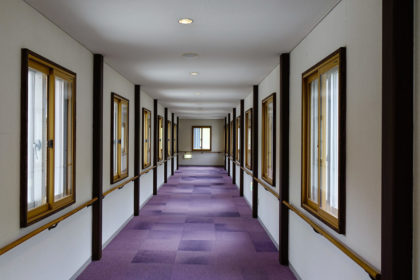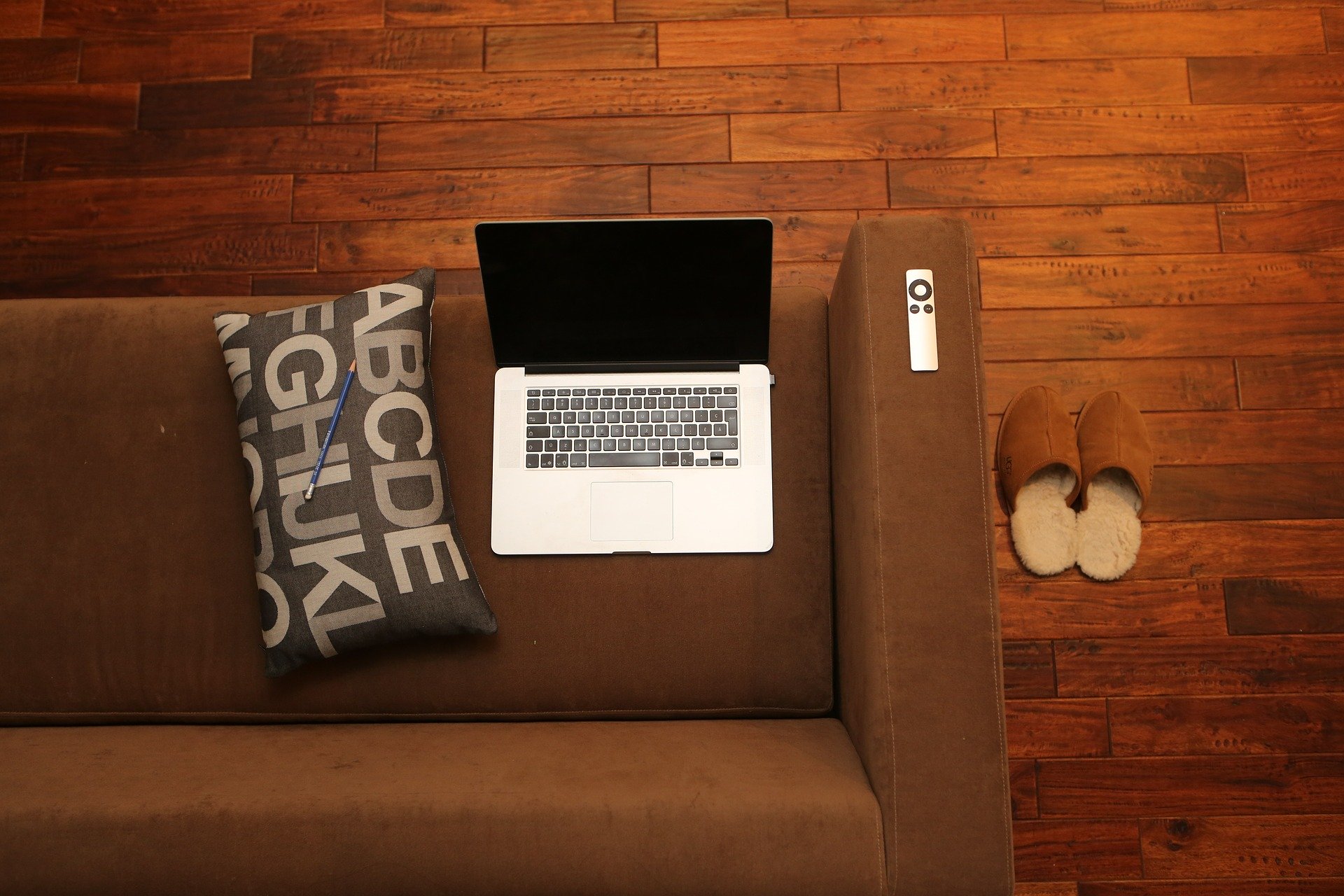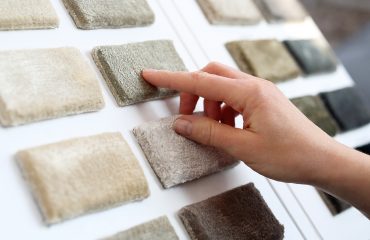
Choosing the right commercial flooring can be a challenge, particularly when you have a long list of criteria you need your flooring choice to fill.
Fortunately, the last decade has seen a dramatic shift in the commercial flooring industry with new and innovative trends emerging that are changing the appearance and performance of commercial flooring. Carpet has remained popular over the years for commercial spaces because of it’s acoustic and foot traffic benefits. Businesses might also choose carpet because of style and appearance. Here we evaluate whether carpet is a good choice for commercial floors, including all the criteria you need to weigh up when choosing the ideal flooring for your commercial space.
Carpet Choices For Commercial Spaces
Commercial carpeting can come in many different styles and designs to match your commercial space and your needs. When it comes to carpet in commercial spaces, there are three ways to do it:
Broadloom carpet is also known as wall-to-wall carpet, and is the most traditional and well-known form of carpet in commercial spaces. This is where commercial carpet is fitted in a continuous form across the floor surface.
Modular carpet is also known as carpet tiles. Modular carpet is durable, easy to install, and easy to replace which makes it ideal for commercial spaces. Carpet tiles or smaller more manageable squares of carpet that are installed seamlessly side by side for a smooth carpet finish.
Area rugs are generally not as popular in commercial settings, although they are common in some business types like premium health care and hospitality. For the most part commercial area rugs are used as centerpieces and design tools in a commercial space, rather than a standalone form of flooring. However commercial area rugs can make an important addition to the ambience and style of a business and should be considered.
Evaluating Your Commercial Space
When deciding on the right carpet choice for your commercial space it’s important to look at the characteristics of the space you’re working with. Evaluating your commercial space is absolutely essential before deciding to install carpet flooring. This is because the function and characteristics of every commercial space is different. Just because carpet works well in one type of commercial space doesn’t mean it will perform as well in a different commercial space. Each commercial space needs to be assessed on its own merits before carpet is installed.
What Is Your Commercial Space Used For?
The first thing to consider is what your commercial space is used for. Commercial properties fall into a number of different categories and can be utilized by people for both business and leisure. Hotels, restaurants, cafés, and sports centers host leisurely traffic. Business oriented commercial spaces include office buildings and industrial warehouses, garages, and distribution centers. Commercial spaces that integrate both business and leisure purposes include retail stores, shopping malls, and other shops.
Understanding where your commercial space fits into within these categories helps to determine which type of flooring is best for your space. You may need a attractive, pleasing appearance more than durability or stain resistance in a retail store, or abrasion resistance and shock absorption over style in a warehouse. Some businesses will need to prioritize foot traffic demands, load tolerance, and durability over the appearance of flooring.
Carpet doesn’t always stand up in the heaviest duty of commercial environments like warehouses and garages. Carpet also has a higher cleaning burden when compared to other commercial flooring types. Therefore, it isn’t recommended for areas that need regular intense cleaning or that have high hygiene requirements. Carpet is ideal in environments where sound reduction, appearance, and warmth of an atmosphere is prioritized. This can include hotels, restaurants, cafés, retail stores, offices, colleges, and schools.
What Is The Environment Like?
As mentioned above the environment that your commercial space as in will determine the appropriateness of different types of flooring. For example, wall-to-wall carpet can be very difficult to install in open plan offices where carpet tiles are usually preferred. If there is a high risk of spills in your commercial environment or there’s a lot of indoor outdoor traffic, broadloom carpet may not be the ideal choice, but modular carpet allows you to remove stained tiles and replace them. If your commercial space is subdivided into smaller area is like retail stores or individual offices, wall-to-wall carpet can be the most attractive and practical choice. Looking at the structure and overall environmental factors of your commercial space will help you decide whether carpet, and which type of carpet, is a good choice for you.
What Are Your Design Priorities?
Another consideration when choosing flooring for your commercial space should be design priorities. For many customer oriented businesses like hotels, restaurants, retail stores, and cafés, the design and the physical appeal of the commercial space is of critical importance. Poor design can discourage customers for choosing your business whereas stunning design can really make your business stand out from the rest. In many cases, carpet is the most obvious design choice for a commercial space, such as a hotel room or a premium office space. With most commercial spaces, calmer, non-disruptive design choices are advisable, while a lush, noticeable area rug might be the perfect choice for some goals.
Important Factors For Choosing Commercial Flooring
Here are the characteristics one should consider when taking an overall look at the properties of commercial flooring.
Durability
The durability of commercial flooring is one of its most important characteristics. Commercial flooring needs to be rugged so that it can withstand heavy traffic and loads without requiring replacement often. This helps to maintain the clean appearance of the space while also minimizing the cost of replacing flooring.
Ease Of Cleaning
Commercial spaces often have higher standards of cleaning than residential spaces. Because commercial spaces also get more use and traffic, they can accumulate dirt and pathogens faster. Food preparation areas and healthcare facilities may have particularly high cleaning standards to meet. Flooring that stays clean or is easy to clean is a big priority for businesses. Easily cleaned flooring helps to ensure hygienic commercial environments while also keeping the spaces attractive.
Use Of Space
Commercial flooring choices are also influenced by how and how often it’s used. Things to consider are foot traffic and rolling loads such as trolleys and carts.
Appearance
You’ll want flooring that compliments the overall decor and retains its attractive appearance by being stain, scratch, and damage resistant.
Noise
One of the least considered but most important aspects of commercial flooring choice is noise. Some flooring types are noisy when walked on, which can be distracting in commercial environments. Likewise, certain flooring materials can create poor acoustics in a commercial space which can create problems in hospitality, education, or healthcare facilities.
Health And Safety
Health and safety is an important concern. Commercial flooring should be safe to walk on and remain slip resistant even when wet. Commercial flooring should also have moisture resistant properties that allow it to prevent mold growth.
Benefits of Commercial Carpet
Commercial carpeting offers some valuable benefits:
- Excellent noise reduction
- Attractive appearance
- Cushions falls and reduces slipping
- Warmth and Comfort
- Cushioning joints when walking and standing
- Sustainable, environmentally friendly options
- Low VOCs
- A wide variety of design and color options
Drawbacks of Commercial Carpet
However, many businesses have concerns about installing carpet in commercial spaces due to –
- Potential lack of resistance to heavy loads and traffic
- Difficulty in cleaning commercial carpet, absorption of spills and stains
Cleaning For Commercial Floors
Keeping commercial floors clean is one of the highest priorities for businesses. Commercial flooring should be easy to clean to maintain an attractive appearance, a hygienic environment, and a safe and slip-free workplace.
Hard flooring types such as concrete, rubber, vinyl, or luxury vinyl tiles, and porcelain tiles take pride of place in being easiest to clean. While tiles might occasionally require commercial tile and grout cleaning to restore their original luster, hard floors are generally more easy to clean to a high standard in a commercial setting.
Commercial carpet is known to be more difficult to clean than hard flooring types. On the other hand, many commercial spaces such as hotels, restaurants, cafés, offices, conference centers, colleges, schools and retail stores truly require the appearance, comfort, and performance of carpet in their interiors. These environments also tend to be lower traffic and have less exposure to food stuffs, chemicals, and other staining agents which makes the installation of carpet in these spaces ideal. It is still important to consider the appropriate cleaning regimen to keep commercial carpet clean and safe for all users.
Daily vacuuming
Commercial carpet should generally be vacuumed daily, and more than once a day in high-traffic and high use areas. Powerful commercial vacuum cleaners should be used to lift as much surface dirt and dust as possible from high-traffic carpets.
Professional Commercial Carpet Cleaning
Commercial carpet get far more use and abuse than residential carpets. It’s important to have professional carpet cleaning for commercial carpets. Commercial carpets should be professionally cleaned at least quarterly ideally, although some commercial environments may require more or less frequent professional cleaning. Professional cleaning also helps to preserve your carpets and ensure their longevity, so they look better for longer.
Spot Cleaning
One of the benefits of carpet tile squares is that the individual tiles can be removed and replaced if damaged or stained. This makes maintenance and replacement of carpet tiles much more cost effective than wall-to-wall carpet. However, if your wall-to-wall carpet is bleached or stained, you will require professional carpet spot removal to get your carpet back to new looking condition.
Installing Commercial Carpet
Wall-to-wall carpeting is more difficult to install than other commercial flooring choices because it often requires carpet padding. While carpet padding adds a luxurious feel to carpeted commercial spaces that can’t easily be substituted, carpet padding can also present hygiene and cleaning issues in some commercial environments.
The good news is that most commercial carpets don’t require carpet padding. Commercial carpet is generally built to be more moisture resistant and to have a stronger backing and underlayment to support the durability and resilience of the flooring.
Carpet tiles have provided an innovation in offices, retail stores, and other shared spaces where carpet is the preferred commercial flooring. Because carpet tiles come in smaller, easy to manage square shapes of carpet, they are extremely easy to install and replace when necessary. Carpet tiles can be installed directly on top of hard or concrete floors and more resilient and moisture resistant than many other carpet types.
Many commercial spaces that want to retain the warmth and appearance of carpet and now turning to carpet tiles for their commercial flooring installations.
Analyzing Unique Requirements
Every commercial environment is different, and the flooring requirements will be different for each space as well. Carpet is the ideal choice where comfort, appearance, and noise reduction of the top priorities for a business.
By weighing what you need from your commercial flooring, you can decide whether carpet is the right choice for you. Contact a commercial carpet professional for help weighing your options and finding the carpet that matches your space, needs, and budget.



